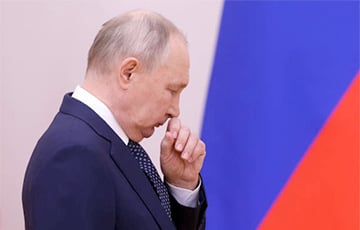The Telegraph: Putin Won’t Be Laughing For Much Longer
12- 2.04.2025, 12:46
- 22,368

The gap between Trump and Europe is shrinking.
The chill between Europe and US President Donald Trump is likely to be temporary. United States has again embraced the “Wild West” – brash, individualistic and unapologetically pragmatic.
Europe is doubling down on a technocratic, consensus-driven and regulations-obsessed approach, writes geopolitical strategist, political scientist, columnist for The Telegraph Mark Brolin.
The differences between the US and Europe may seem irreconcilable. There are plenty of predictions today about the inevitable breakup of NATO, which benefits Russian leader Vladimir Putin. Yet the transatlantic rift is likely to be only temporary.
If anything, the current transatlantic tensions and forced reset may be a blessing in disguise. For decades, the US-European relationship has been trapped in an anachronistic post-World War II framework, with Europe heavily reliant on American security guarantees.
The threat supposedly posed by Russia came to undergird this relationship. The collapse of the Soviet Union exposed Russia’s status as a superpower to be largely based on bluff.
Yet Europe continued to emphasise Russian strength, perhaps in part to ensure that US taxpayers continued to foot the defence bill. The US military and intelligence communities have had a similar vested interest in playing up the Russian threat. That was also unsurprising. If their role is to identify risks and threats, that is precisely what they will find.
But a recalibration is long overdue. Russia, while clearly still posing a serious threat to Ukraine, Georgia, and Moldova, is geopolitically weaker than it has been in centuries. The Kremlin regime, alongside client state Belarus, represents one of the last bastions of 19th-century despotism. Putin and his fellow rogues will be acutely aware that their grip on power is likely to weaken significantly if Ukraine successfully breaks free and its GDP per capita begins to catch up with the rest of Europe, following the path of other Eastern European countries that have already left Russia’s sphere of influence.
Advertising
So despite Putin’s posturing about “holding all the cards”, this is largely bluster. With two European nations with nuclear weapons and no less than four European nations with a GDP higher than Russia’s, Europe is more than capable of shouldering the responsibility for its own defence against a Russia still in relative geopolitical decline. If, that is, it can be pressured by the United States into doing so.
Moreover, it makes sense that the United States shifts its strategic focus towards countering China, now its primary geopolitical rival. Averting a crisis in Taiwan is in everyone’s interest, so this pivot benefits Europe as well.
The US-European relationship remains deeply interdependent, despite today’s frostiness. Economically, Europe is one of America’s largest trading partners. Militarily, the US remains a much more credible force, if acting with the backing of Nato members.
So while Trump has pushed for a redistribution of burdens within the alliance, he cannot afford to alienate European allies entirely without undermining US strategic interests. Even if he tries, Congress is highly unlikely to allow him to take steps as drastic as leaving Nato. Also, as European members of the alliance become more realistic about the need to invest in their own defence, their value as US military partners increases.
As for the economy, Trump’s positions on trade tariffs and Ukraine have always been at odds with an important faction of the Republican Party. Yes, this faction has been forced to lie low for a while, but as the Trump honeymoon period comes to an end (perhaps sooner than many expected), more pushback can be expected.
Moreover, market forces might prove an even more effective corrective mechanism for constraining Trump’s appetite for trade wars with Europe. Any significant increase in protectionism would hurt American businesses, putting additional pressure on the administration. Also, Trump’s points about the EU having been more protectionist in certain sectors (auto industry, agriculture) have merit. Recalibration might contribute to easing transatlantic friction.
The gap is shrinking
Shifting political fortunes on either side of the Atlantic are similarly likely to work in favour of some sort of rapprochement. In Europe, Merkelism is in retreat, while national populists are on the rise. At the same time Trump’s powers might already have peaked. These powers are likely to diminish further in November 2026 following the midterm elections, typically when US presidents on their second term begin to be seen as a lame duck. The cultural gap will narrow as new politicians step forward or old politicians reinvent themselves.
Brulin writes:
“Obviously, in the short term there will be losers from the current split – Ukraine chief among them. For years to come a public blame game must be expected on both sides of the Atlantic on why enough wasn’t done to ensure it could win the conflict. It was moronic of Europe to disarm, increase its dependence on Russian natural gas, and ignore three US presidents who have been open about the need for a US strategic pivot to Asia (Obama, Trump and Biden). It is moronic of the current US administration to treat Russia as a fellow superpower and unnecessarily accept big Russian territorial gains even before peace negotiations have started.”
Still, when the dust settles after this adjustment period, we may find that the transatlantic alliance emerges as strong as during the Cold War – rooted not in groupthink but in readiness for the future, the political scientist convinces.
Moreover, in the coming years, Europe is likely to put itself in a position to face Russia with greater self-confidence. How will the Kremlin continue to justify to its own population that it is better to live poorer, with less peace and far more war casualties than in former Soviet states like Poland, Estonia, and the Czech Republic?
“Believe it or not Putin’s grip on power is looser than many presently think. Someone should tell the White House,” the expert added.











